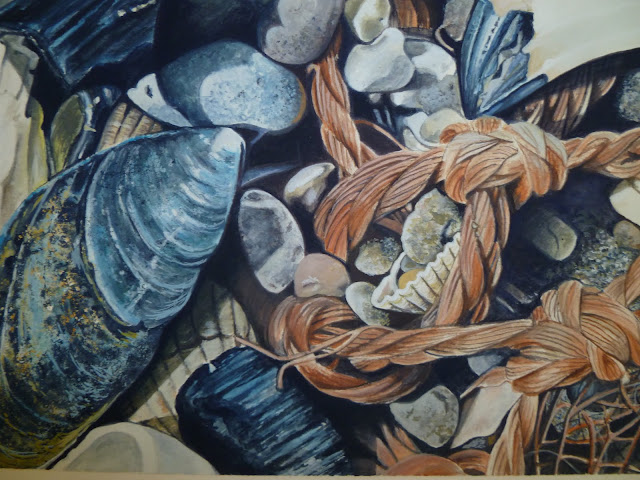The seashore - Gouache by Lorraine Rimmer
One of the biggest problems with eating shellfish is how we prepare them and not shellfish themselves. They’re often served with butter, mayonnaise based sauce, battered, breadcrumbed and fried. Just about everything you’d want to avoid on a weightloss or healthy diet!
However mussels and clams are a wonderful food with a delicate taste that are high in protein and low in cholesterol and fat. So why not try steaming and serving with fresh tomato, white wine and a squeeze of fresh lemon as a healthy, optional way of cooking them.
Fresh clams and mussels
serves 2 - 3
Ingredients
900 g (2 lb) fresh mussels
450 g (1 lb) small clams, such as venus clams
25 g (1 oz) butter
1 - 2 large garlic cloves, skinned and crushed
1 small onion, skinned and finely chopped
150 ml (1/4 pint) dry white wine
225 g (8 oz) ripe tomatoes, chopped
finely grated rind of 1 lemon
30 ml (2 tsp) chopped fresh parsley
salt and pepper
Method
To prepare the mussels, wash them thoroughly under running cold water, then scrape off any barnacles with a small sharp knife. Cut off the fibrous beards that protrude from between the shells. Wash in several changes of water. Discard any cracked mussels, or any that do not close when tapped sharply with a knife.
Scrub the clams thoroughly and discard any that are cracked or open.
Melt the butter in a large pan, add the garlic and onion and cook gently for a few minutes, until the onion is softened. Add the wine, tomatoes, lemon rind and half of the parsley. Bring to the boil.
Add the mussels and the clams to the pan, cover and cook over a high heat for 3 -4 minutes or until the mussels and clams are open, shaking the pan occasionally. Discard any mussels or clams that have not opened.
Season to taste. Transfer to two large bowls or soup plates and sprinkle with the remaining parsley. Serve with lots of crusty bread.
Nutritional values
Shellfish are a great source of vitamin B-12 and can be eaten raw, baked, steamed, fried, or made into chowder. In addition to vitamin B-12 shellfish are a good source of zinc, copper, and iron. Clams provide the most vitamin B-12 but mussels and oysters are also good sources.
Vitamin B-12, or Cobalamin, is the largest and most complex vitamin currently known to man. A slight deficiency of vitamin B-12 can lead to anemia, fatigue, mania, and depression, while a long term deficiency can potentially cause permanent damage to the brain and central nervous system. Vitamin B-12 can only be manufactured by bacteria and can only be found naturally in animal products, however, synthetic forms are widely available and added to many foods like cereals. Vitamin B-12 can be consumed in large doses because excess is excreted by the body or stored in the liver for use when supplies are scarce.
Stores of B-12 can last for up to a year.



